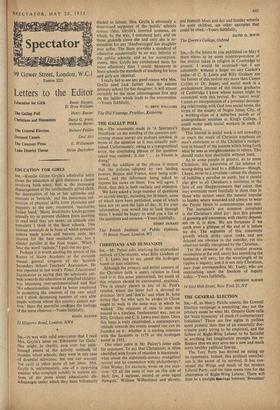Sia.—In the letters to you published on May 6 there
seems to be some misinterpretation of the interest taken in religion in Cambridge at present. I would be surprised—but I am admittedly without a finger on any Cantab's pulse—if C. S. Lewis and Billy Graham are the heroes of this revival any more than Canon Collins or Dr. Soper; and social work is a predominant interest of the recent graduates of Cambridge I know whose names might be connected with this revival. By 'social work' I mean an interpretation of a personal develop- ing relationship with God into social terms, the terms of the society of Negro Jersey City, of a working-class or a suburban parish or of undergraduate societies at King's College. I could name such social workers in each of these places.
This interest in social work is not nowadays so much the result of Christian emphasis on man's sinfulness as of the Christian's recogni- tion in himself of the sources which bring forth what he secs as unrightcousness in others. This should make him charitable without limit.
As to some people in general, so to some Christians, this awareness of the sources of wrong-doing can lead to a diffidence—though, I hope, never to a cynicism—about the chances of building a paradise on earth; but it should also give to all Christians a resilience in the face of any disappointments that occur, that may eventuate more fruitfully in them than in those who cannot resist the natural impulse to harden where wounded and always to wear the Purple Heart to commemorate one scar.
The humanist's not common complaint is the Christian's chief joy : that this process of growing self-awareness, with charity depend- ent on it, is slow. We are fortunate if we catch even a glimpse of the end of it before we die. The segments of this concentric growth which strike upon rocks and are delayed arc obvious to the outsider, yet too often too tardily recognised by the Christian.
34 East 68th Street, New York 21, NY THE GENERAL ELECTION










































 Previous page
Previous page